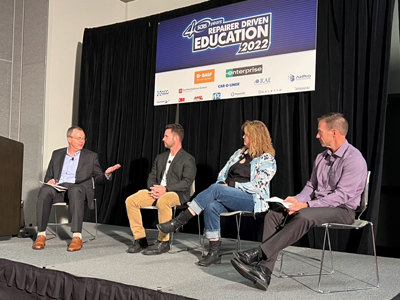EVs
Mundy said every manufacturer his shop repairs has an EV platform. To get ready, he said his shop is set up to mitigate fire in the paint booth and office, and will purchase new equipment as needed.
“I don’t really have any fears,” he said. “We will just have to be prepared for them as they come our direction.”
Willett said EV manufacturers have individualized requirements on how to move their vehicles.
“I recommend if you have towing [services], stay away from EVs at this point, unless you’ve really got it nailed,” Willett said. “The exposure is too great for what you’re going to earn on that job.”
Kennedy said he has handled claims in which an EV caught fire on a rollback because it wasn’t in a safe state.
“There’s a whole realm of things that comes with proper training, more exposure to [EVs],” he said.
Willett added batteries are still one of the top three sources of fire in the collision repair industry---even with an ICE car.
Throughput
Lewis said her shop has enjoyed a lot of success with its mobile estimating service, which it only advertises on the side of the van it brings to customers.
“Elderly customers don’t know how to download their insurance company app [to submit claim pictures], so we go to them,” she said. “If nothing else, we capture that customer.”
Mundy said AI-generated estimates still have their issues.
“A $1,200 estimate through the app can turn into a $12,000 job [after teardown],” Mundy said. “That makes it take longer. You gotta reconcile it, wait on that to come back.”
Mundy also said delays for more advanced parts, like anything with a microchip or sensor, are making the cycle time take longer.
Lewis said one of her customers had a 2022 Toyota Camry that needed a rear distance sensor. The part was delayed indefinitely; the customer ran out of rental coverage and wound up trading the car as-is to a local dealer. It was another six months before the sensor arrived.
Willett said an insurance company not paying a shop to do something doesn’t mean it doesn’t have to do it to properly repair a vehicle.
“The agent insuring you should be able to help you explain that to the bill payer,” Willett said. “You’re on the hook for your work.”
Mundy said as a non-DRP shop owner, he explains to the customer up front when they might have to pay a little more to cover something the insurance company refuses to pay for.










Abby Andrews